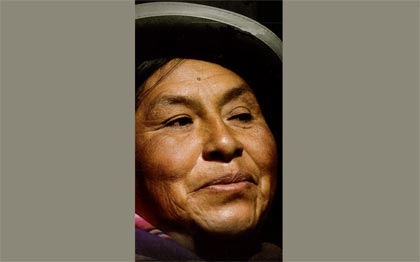Between 1944 and 1948, they raised an unprecedented $27 million for rebuilding and relief efforts through a campaign called the "Crusade for Christ."
In 1948, General Conference institutionalized this fundraising effort and called it "The Advance for Christ and His Church," offering specific projects called Advance Specials about which people could learn and support financially.
The Rev. Donald E. Redmond was a pastor in the Southwest Texas Conference when The Advance was created. In a 1986 letter to researcher the Rev. Dwight Busacca, Redmond writes when The Advance started, "Each annual conference was assigned a mission field as its special responsibility."
In 1953, Southwest Texas was assigned to support mission in Bolivia. As the conference director of The Advance, Redmond traveled there in 1954 with a local missionary. "I spent the Sundays of the next year visiting churches to speak about and show slides of the work in Bolivia," he said.
Redmond eventually became the head of The Advance Office. It is now part of the General Board of Global Ministries in New York. He believed that "the genius of [The Advance] was a relationship between the church in the U.S. and projects in missions, at home and abroad.
 |
| Justa Mamani of Bolivia thanks delegates for their support through The Advance. Supporters started donating to mission work in Bolivia through The Advance in the early 1950s. Photo: UMNS/Mike DuBose |
The 1956 General Conference voted to make The Advance permanent. Today, its structure remains mostly unchanged, though it now includes opportunities for missionary support. The Advance is no longer just a way for people in the United States to send money abroad. The gifts, like the service of United Methodists, are from everywhere to everywhere.
Many Advance Specials have stood the test of time. In a 1952 report to General Conference, The Advance committee listed a mission in Ganta, Liberia, as a beneficiary of the Week of Dedication offerings. Like today's One Great Hour of Sharing, the Week of Dedication raised undesignated funds for The Advance to distribute.
This funding would turn the modest Ganta health post into a hospital (#15080N). "The buildings will provide wards for men and women, surgical rooms and classrooms for nurses," the 1952 report stated.
In 1955, the hospital came under fire during Liberia's civil ar. Taking what supplies they could carry, the staff fled to Diecke, a refugee camp just across the border in Guinea. Today, the Diecke clinic receives about 25,000 patients each year from both Liberia and Guinea.
However, its growth is stymied by the temporary facilities that it rents. Again, it needs more space. Through The Advance, the Diecke clinic forged a fundraising partnership with churches in Florida, Alabama and Texas. Construction on a new hospital in under way.
Now more the 750 Advance mission projects are funded every year in more than 100 countries. Since it began in 1948, The Advance had enabled gifts totaling more than $.2 billion to reach their intended recipients. Each time you convenant with a missionary or support a project, you are part of this generous, connectional history.
Julia Kayser, freelance writer for the General Board of Global Ministries, Contributing to this article were Chris Andrews of the United Methodist Library at Drew University and Christie House, editor of New World Outlook, the Rev. Dwight S. Busacca, Melissa Hinnen and Ellen Knudsen, all staff with the General Board of Global Ministries.
The Advance is the accountable, designated-giving arm of The United Methodist Church. The Advance invites contributors to designate support for projects related to the General Board of Global Ministries. Individuals, local churches, organizations, districts and annual conferences may donate to The Advance. One hundred percent of every gift to The Advance goes to the project selected by the giver.





